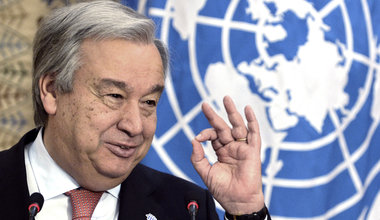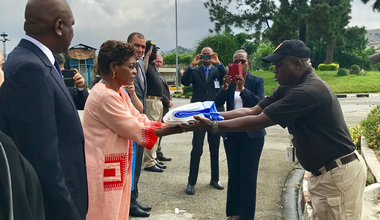Ending the threats to peace and security in West Africa: Special Representative of United Nations Secretary-General for Côte d’Ivoire pleads for renewed determination of States in the region and ECOWAS

The Special Representative of the United Nations Secretary-General for Côte d'Ivoire and head of the United Nations Operation in Côte d'Ivoire (UNOCI), Mrs Aïchatou Mindaoudou has made a plea for renewed determination of States in the region, a determined commitment of partners and additional resources in order to end the threats to peace and security in West Africa. She was speaking during the opening ceremony of the High- level regional conference of donors on organised transnational criminality in West Africa on Monday, 28 October 2013 in Abidjan.
In her speech, the chief of UNOCI highlighted the threat to peace and stability in the Sahel region due to acts of terrorism and organised transnational criminality. "The number of acts related to maritime piracy in the Golf of Guinea have exceeded those in the Somalia region for the first time since 2012, said Mrs Mindaoudou during the opening ceremony of the conference.
Mrs Mindaoudou stressed the important role that peacekeeping missions deployed in the region continue to play in the implementation of the initiative taken by the UN Department of Peacekeeping Missions (DPKO) and the West African Coast Initiative (WACI). The Special Representative said that the UN Police components in Guinea-Bissau, Liberia and Sierra Leone have provided support to their respective national, regional and international counterparts as part of this initiative in setting up cells to fight against transnational criminality. "They have provided technical and operational assistance and strengthened capacity," explained the head of UNOCI, adding that the units for the fight against transnational criminality in these countries had carried out a number of important inquiries into complex criminal acts". However, said the Special Representative, there is still a lot of work to be done, adding that any delay in a collective response will give networks involved in transnational criminality that have already been established, to consolidate their presence and perpetuate their gains.
Mrs Mindaoudou recalled the importance of a coordinated and coherent, and moreover a pragmatic intervention by the actors at the global, continental, sub-regional and national level. In order to ensure that this important initiative is a success, UNOCI's chief had earlier pleaded for renewed determination of States in the region and in the Economic Community of West African States (ECOWAS) and a determined commitment of key partners such as the World Bank and INTERPOL and also for the necessary expertise and resources to be provided by the donors.
The Special Representative of the UN Secretary-General for West Africa and head of the UN Office in West Africa (UNOWA), Mr. Said Djinnit, for his part, said that West Africa us today confronted with a combination of security threats which will be dangerous to ignore. "Organised transnational criminality, especially drug trafficking, maritime piracy and terrorism are plagues which reinforce one another leading to the weakening of States and their institutions and the destruction of societies," said Mr. Djinnit, adding that "the whole of West Africa is exposed to instability due to the increasing strength of organised criminal networks". For the United Nations, explained Mr. Djinnit, the fight against terrorism, organised transnational criminality, including drug trafficking, is one of the essential pillars in the prevention of conflict as well as the consolidation of peace and development. He said that the United Nations had been mobilising during several years in the sub-region to help countries concerned over the destabilising effects of international criminality and terrorism. "There is also a need to consolidate political mechanisms at the national and international level," said the chief of UNOWA. He concluded by reiterating the willingness of the United Nations to contribute as much as possible to the collective efforts in the fight against organised criminality and drug trafficking.
According to the President of the ECOWAS, the donor conference should be an opportunity to develop a common approach on issues linked to drug trafficking and organised criminality. "We will assess the situation in order to know what remains to be done and the priorities of our cooperation," he said. Based on the 2012 report of the International Organ on Drug Control, West Africa continues to be the transit region for the trafficking of cocaine, noted Mr. Kadré Désiré Ouédraogo. Echoing the words of other speakers, Mr. Ouédrogo appealed for a common approach to tackle these threats before highlighting key projects carried out by the Commission during the past year.
Mr. Yury Fedotov, Executive Director of the United Nations Office Against Drugs and Crime (UNODC) and Director-General of United Nations in Vienna, said that the donor conference offered a renewed opportunity for a common commitment to everyone to tackle the challenges and mobilise the necessary resources for a coordinated response. "The West Africa region is among the most vulnerable with regard to illicit drugs activities, organised criminality, money laundering, corruption and terrorism". Noting an alarming increase in these illegal practices during recent years, Mr. Fedotov also highlighted the new ways of operating by traffickers, the production of synthetic drugs and cyber criminality, while drawing attention to the damage done by drug abuse in the region while expressing regret at the lack of means to protect young people against these plagues. "The United Nations Security Council on several occasions, has reiterated the importance of international cooperation and support to fight against these crimes," said the Director-General of the United Nations in Vienna, who called for the consolidation of all efforts in the fight against drugs, organised crime, corruption and terrorism.
The Ivorian Prime Minister, Daniel Kablan Duncan, who officially opened the regional conference, congratulated UNOWA and UNOCI on their involvement and determination in the fight against transnational criminality. He welcomed the cooperation between ECOWAS and UNODC which has resulted in them agreeing on objectives to assess the security priorities in West Africa and to mobilise the resources to support ECOWAS member states. The Prime Minister also welcomed the constant support and assistance of donor countries in the implementation of programmes of the West African Coast Initiative which has led to the setting up in Sierra Leone, Liberia and Guinea Bissau of cells for the fight against transnational criminality. The Ivorian Prime Minister noted that these cells were already functioning and operational and that they needed their capacity to be strengthened. Mr. Daniel Kablan Duncan thanked the 24 donors countries in West Africa for their constant support and efforts.
The conference and appeal for funds was based on four themes, including the ECOWAS regional plan of action to combat illicit drug trafficking, organised crime and drug abuse, the West African Coast Initiative, the Integrated United Nations Strategy for the Sahel and the UNDOC Strategy for the Golf of Guinea.
The donor conference was co-organised by ECOWAS, UNDOC and UNOWA. It was attended by representatives of West African and Sahel countries as well as regional organisations, development partners and UN agencies.
 UN
UN United Nations Peacekeeping
United Nations Peacekeeping








